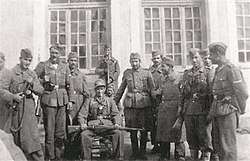Friedrich Schubert

Friedrich (Fritz) Schubert (Greek: Φριτς Σούμπερτ; 21 February 1897, Dortmund – 22 October 1947, Heptapyrgion) was a Greek-speaking German NCO Sonderführer of the Nazi Wehrmacht.[1] As head of the Jagdkommando Schubert, a paramilitary force terrorizing the civilian population during the Nazi occupation of Greece in World War II, he committed numerous atrocities in Crete and Macedonia.[2]
Tried by a special court for war crimes in Athens, he was found guilty over the killing of over 250 civilians, sentenced 27 times to death and executed.
Earlier life
Few details of Schubert's pre-WWII life have been verified. According to some sources, Schubert was born as Petros Konstantinidis (Greek: Πέτρος Κωνσταντινίδης), son to a rich tobacco merchant in Smyrna and emigrated to Germany at a young age. There, he joined the National Socialist Party and became a dedicated Nazi. However, it is known today that Schubert was German, born in Dortmund in 1897.[3] He served in the Imperial German Army during WW I, probably fighting in Turkey and being decorated with the Iron Crescent medal. In the 1920s, he returned to Turkey where he worked for Kemal's army and later lived in Alexandria for about fifteen years. After the outbreak of WW II, Schubert returned to Germany and joined the Ersatzheer.
As a Wehrmacht officer

Schubert made his first appearance on Crete in 1941 as an interpreter to the German commander of Rethymno. Later, he succeeded Hartmann as the head of the German counter-espionage network. As he could speak Turkish and had a strong Turkish accent when speaking Greek, Cretans nicknamed him "the Turk". In 1943, after recruiting several convicted Greek criminals and Germanophiles (e.g., members of the Tzoulias family from Krousonas), he established his notorious Jagdkommando (Greek: Εθνικό Απόσπασμα Καταδίωξης Κομμουνιστών - ΕΑΚΚ) in eastern Crete.[3]
The Jagdkommando Schubert was an anti-communist militia unit intended to capture local resistance fighters and those who helped them. Its conscripts, who were dressed in Wehrmacht uniforms, become known among Cretans as the Schuberai or Schubertiani (Greek: Σουμπερίτες).[4] They were notorious for their sadistic practices during attacks against civilians that involved beating, torture, shootings and the destruction of numerous villages (e.g., Oropedio Lasithiou, Rodakino, Kali Sykia, Kallikratis, etc.).[5][6] Even today, calling someone a Schuberai is considered in Crete to be a serious insult synonymous to treachery and cruelty.
These events had enraged the local resistance fighters and made them want to eliminate the Schuberai at all costs. Soon, Schubert's unit lost its effectiveness as it could not operate away from Chania without the escort of a large Wehrmacht protective force. Hence, in 1944 Schubert and his unit were transferred to Macedonia where they reinforced the collaborationist battalion of G. Poulos (a.k.a. Poulos Verband).[7] While in Macedonia, Schubert's group continued their hideous activities, being responsible for the massacres of Chortiatis and Giannitsa, among others.
After World War II
After the war, Schubert attempted to return to Greece. On 4 September 1945 he was arrested in Eleusina on board a plane repatriating ex-concentration camp prisoners back to Greece. On August 5, 1947 he was found guilty of 271 murders and several other crimes including arson, burned numerous villages, rapes, murder of women and children in cold blood, spoils of war, and thefts. For these, Schubert was convicted 27 times to death and several thousand years of imprisonment. He was executed in Eptapyrgio, Thessaloniki on October 22, 1947.
See also
Notes
- ↑ A Sonderführer was a soldier of special skills needed by the army, but lacking the military training necessary for being promoted to a regular rank.
- ↑ Αλ. Ασωνίτης (28 October 2001). "Σας αρέσει ο κ. Σούμπερτ;". Ελευθεροτυπία - Απογευματινή Εφημερίδα. Archived from the original on 17 February 2013. Retrieved 22 November 2017.
- 1 2 Φωτίου, Θ. Η Ναζιστική Τρομοκρατία στην Ελλάδα – Η αιματηρή πορεία του Φριτς Σούμπερτ και του ελληνικού "σώματος κυνηγών" στην κατοχική Κρήτη και Μακεδονία, εκδόσεις Επίκεντρο, Θεσσαλονίκη 2011.
- ↑ "Οι δίκες των Γερμανών κατακτητών της Κρήτης". Εφημερίδα Πατρίς. 7 July 2008. Retrieved 25 January 2017.
- ↑ Beevor, Antony. Crete: The Battle and the Resistance, John Murray Ltd, 1991. Penguin Books, 1992
- ↑ Kiriakopoulos, G.C. The Nazi occupation of Crete, 1941-1945, Praeger Publishers, 1995
- ↑ Mazower, Mark. Inside Hitler's Greece: The Experience of Occupation, 1941–44, Yale University Press, 1995.